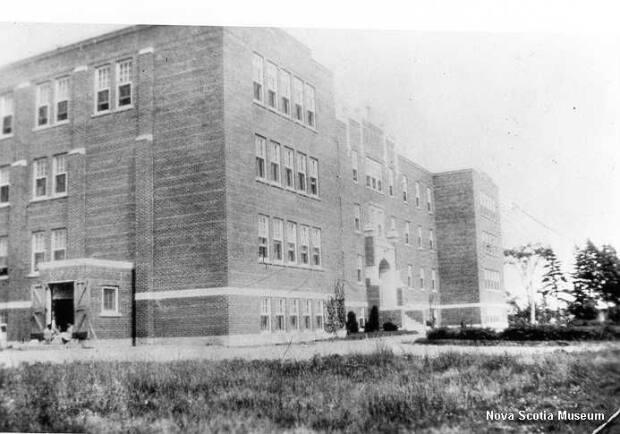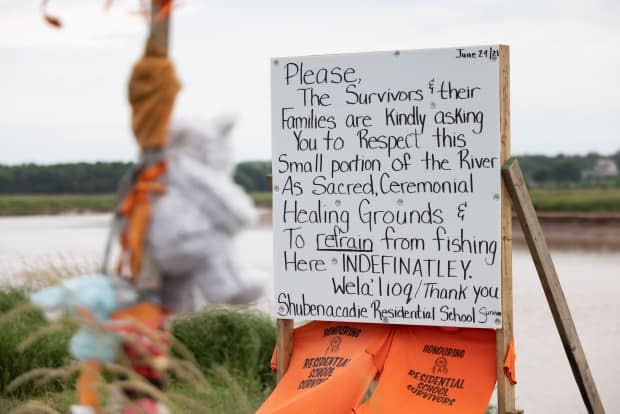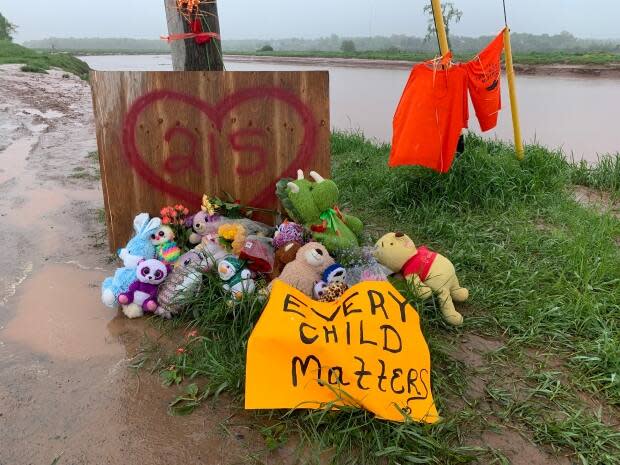Halifax nuns apologize for role in residential school, but refuse to discuss it

WARNING: This story contains distressing details.
A group of Halifax-based nuns who operated the Shubenacadie Residential School in Nova Scotia has apologized for its role at the institute, but is refusing to say more about the gesture or whether it's reached out to Indigenous survivors.
The Sisters of Charity staffed the school for its duration from 1929 to 1967. It was named a National Historic Site in 2020 to mark the "discrimination, mistreatment, abuse and neglect" Mi'kmaw children suffered after being forced to attend the school.
Survivors have told of widespread physical, sexual and psychological abuse.
On Monday, the religious order posted an apology to its website.
"The recovery of the unmarked graves at former Canadian residential schools is a stark reminder of the most vulnerable and enslaved in our nations. We hear the cries of hidden children, women, and men. Our breath is laboured as we begin to understand the harm inflicted on the innocent," reads the apology, which was posted as a PDF.
The letter is signed by the nuns' congregational leadership team: Margaret Mary Fitzpatrick, Joan Butler, Joan Dawber, Mary Anne Foster and Mary Lynn Flett.
Fitzpatrick is also the chancellor of Mount Saint Vincent University.
"The recovery of these remains is heartbreaking and shameful. As human beings and as members of a religious congregation that served at two of these schools, we weep. We are ashamed of the cruelty some people can inflict on others," the letter continues.
The National Centre for Truth and Reconciliation lists the names of 16 children who died while at the school, but survivors have said they believe many more children died.
Ground-penetrating radar has been used to search the site in central Nova Scotia as part of investigations similar to those that uncovered the remains of 215 children in Kamloops, B.C. The results have not yet been made public.

The Sisters of Charity refused to speak to CBC News about the apology. The group did not respond to a list of questions CBC News sent, asking if it had made any contact with Indigenous groups, or if the Sisters of Charity intended to do anything beyond posting the letter.
'The sisters ... ran the show'
Chris Benjamin wrote Indian School Road: Legacies of the Shubenacadie Residential School, which investigated the role the Sisters of Charity played at the institute.
He said they are a teaching order of nuns, but often worked in orphanages or hospitals. The institute was "a real chance for them to show their teaching chops." Canada's federal government funded the schools, but the Sisters of Charity staffed them. A priest held the role of principal.
"The government's real goal was to teach them [Indigenous children] to be 'proper Canadians.' The ideology was that the boys should become farmers and the girls should become housewives. Being civilized meant being farmers," Benjamin told CBC News.
The nuns used religious textbooks to teach the children how to be "proper Christians," he said, while Mi'kmaw culture was ignored or mocked.
"It would have been portrayed as backwards, savage," said Benjamin.

When working on his book, he said the Sisters of Charity let him interview official representatives of the organization, but he was not permitted to talk to nuns who had worked at the institute.
The Sisters of Charity also denied him access to its archives. CBC News requested the archives, but the organization again declined to share anything. The National Centre for Truth and Reconciliation said it will upload its copy of the archives later this year.
The nuns kept daily annals in the institute, which was a public document where the women jotted down day-to-day events. A researcher in the 1990s was given access to it, but in 2013, the Sisters of Charity would not share it with Benjamin.

He said he was told that as women, the nuns were low in the church hierarchy and "were part of a racist system." But his research showed that at the school, the sisters had a lot of agency to make decisions.
"The sisters, by and large, ran the show. They had an incredible amount of autonomy. So to me, they weren't just participants in a racist system. They were very much implementers of a racist system as well," he said.
Benjamin said the apology fits in with other statements of remorse the nuns have given over the years, but said the Sisters of Charity has never taken accountability for what its organization did to children at the Shubenacadie institute.
Benjamin said as a white author, he didn't want to exploit an Indigenous survivor's story, so he focused on the white people who created and ran the institute.
"White people, European Canadians, settler Canadians, created and implemented this system and ran it. And we're responsible for it. I think a lot of people like myself feel that today," he said.
"That's an important part of that history as well that we need to be discussing."
Support is available for anyone affected by their experience at residential schools, and those who are triggered by these reports.
A national Indian Residential School Crisis Line has been set up to provide support for residential school survivors and others affected. People can access emotional and crisis referral services by calling the 24-hour national crisis line: 1-866-925-4419.
MORE TOP STORIES

